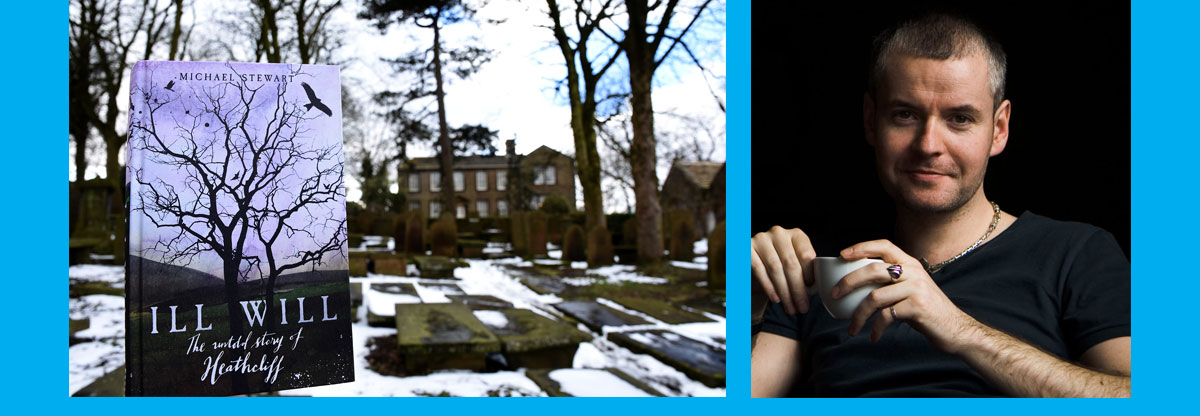 Writer Dr Michael Stewart
Writer Dr Michael StewartThe University’s Head of Creative Writing’s new book attracts TV interest
AN abused young Heathcliff fled Wuthering Heights and after three years he returned to moorland Yorkshire as a wealthy, saturnine gentleman bent on revenge for his humiliations. What brought about the transformation?
His creator Emily Brontë left the episode as a blank canvas. Now it has been filled by the contemporary Yorkshire novelist and lecturer Dr Michael Stewart, who is Head of Creative Writing at the University of Huddersfield. His imagined account of Heathcliff’s missing years has already earned interest from a top TV production company.
The new novel is titled Ill Will – subtitled The untold story of Heathcliff. It provides readers of Emily Brontë’s Wuthering Heights with a new piece of fiction that complements the violently passionate novel that was first published in 1847.
“In fact my publishers have brought out a special edition of Wuthering Heights, for which I have written a foreword. You could, if you wanted, read Emily Brontë’s novel up the point where Heathcliff runs off, read Ill Will, and then go back to Wuthering Heights!” said Dr Stewart.
His account of Heathcliff’s missing period sees one of the greatest anti-heroes in world literature roam a North of England that in the 1780s – the period in which Wuthering Heights is set – was on the cusp of industrialisation, and where Liverpool was a centre for the slave trade – of personal relevance to the dark-skinned Heathcliff.
In Ill Will, Michael Stewart has Heathcliff form an alliance with Emily, a worldly-wise highwayman’s daughter, and they hatch money-making scams based on her claim to be able to communicate with the dead.
But although the new novel is a work of imaginative fiction, inspired by Emily Brontë, it required Michael Stewart to conduct detailed research into the social history of the late eighteenth century.
“The late 1780s are fascinating, with industrialisation, the slave trade, the enclosures acts, highwaymen, press gangs and the construction of canals. It was a very interesting turning point in our culture, and I wanted to take Heathcliff first into the agricultural industries of the period and then to Manchester, where we see the Industrial Revolution – the beauty and the cruelty of it. Then he goes to Liverpool to trace who he is, and slavery is part of that story.”
One phase of Dr Stewart’s research was highly physical. He recreated the walk from the Haworth moors to Liverpool that was made by Mr Earnshaw when he brought the boy Heathcliff back to Wuthering Heights.
“It took me three days to get there. He got there and back in three days. He must have walked continuously without sleeping or stopping to eat!”
Michael Stewart’s fascination for Heathcliff and his period away from Wuthering Heights was triggered in the 1990s by an essay titled Was Heathcliff a murderer? by leading literary critic John Sutherland. The seeds of an idea that led to Ill Will were sown, and eventually a period of sabbatical leave from the University of Huddersfield enabled Dr Stewart to conduct his research, including the trek to Liverpool.
The “untold story of Heathcliff” is newly published – there was a launch event at the Huddersfield Literature Festival – but an option has already been taken by Kudos, one of the world’s leading TV companies, responsible for major productions including Granchester, Tin Star, The Tunnel and current BBC blockbuster Troy.
- Michael Stewart is the winner of a number of prizes for his scriptwriting, including the BBC Alfred Bradley Bursary Award. He won The Guardian’s Not The Booker Prize for his debut novel King Crow (2011), has published a poetry collection, Couples (2013), a second novel Café Assassin (2015) and a short fiction collection Mr Jolly (2016). Ill Will is his third novel, published by HQ, HarperCollins.
More News
Articles explore work Ted Hughes
The work of Dr Steve Ely and Dr James Underwood was published in the Ted Hughes Society Journal
The autobiographical writing of Lady Anne Clifford
Professor Jessica Malay’s new book of the lady described as the “Queen of the North” is launched at Skipton Castle
Engaging the public to read theoretical work
Dr James Underwood receives a British Academy Rising Star Engagement Award to build a bridge between the reading public and academics
